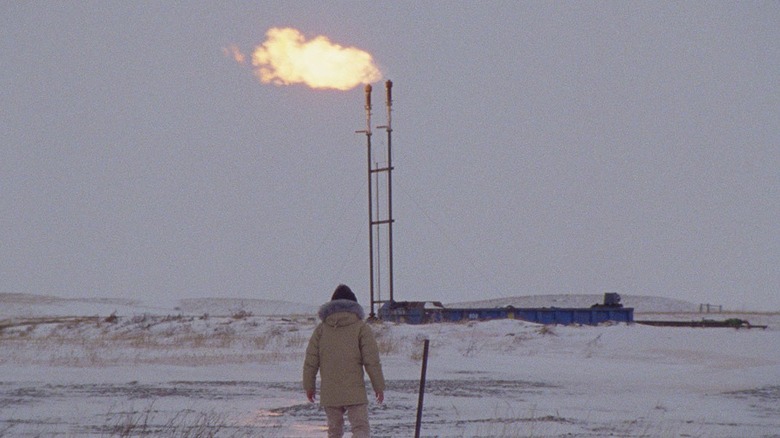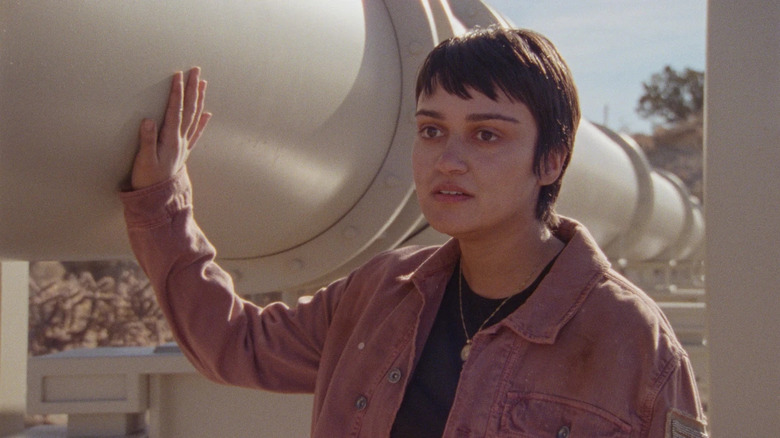How To Blow Up A Pipeline Review: An Explosive Thrill
- A powerful, unbelievably tense thriller with shades of "The Wages Of Fear"
- Doesn't simply preach to the choir about the issues it raises - it's far more morally complex than it looks
- Perhaps we don't learn as much about the characters' lives outside of their activism as I'd like - but this doesn't affect the film's effectiveness as a thriller
In one surprisingly meta moment in "How to Blow up a Pipeline," a character meets another for the first time in a bookstore and comments on the book of the same name as the other is checking it out. It's jokingly pointed out that no, Andreas Malm's non-fiction tome — which Daniel Goldhaber's tense eco-thriller is very loosely based on — isn't the instruction manual it's advertised as, and consequently, neither is its big-screen fiction adaptation. Despite boasting the year's most provocative title, Goldhaber (who previously made the arresting Blumhouse thriller "Cam") is far more interested in exploring the moral quandaries the source material provokes.
This is a movie that derives equal tension from the ethical concerns of committing property destruction for a noble cause, working effectively as both a propulsive thriller you can enjoy with your brain switched off and a thought-provoking examination of a timely issue keenly felt by younger generations. Its title may be designed to trigger an immediate emotional reaction, but there's nothing within Goldhaber's film that isn't effectively considered.
An urgent thriller
It's often remarked that complete environmental collapse isn't something that's going to happen suddenly; as a notorious viral tweet once highlighted, irreversible climate disaster is more likely to be seen first on our social media feeds, with footage appearing more regularly until we're the ones filming it. In short, this line of thinking argues that such disasters will only become more common to the point that they won't even make the news, and that's the point at which it will start affecting our daily lives more directly. This is how the band of outsiders find each other in "How to Blow Up a Pipeline," bonded together by disasters that didn't make headlines, but irreversibly changed their lives for the worse. These include Xochitl (Ariela Barer) whose mother died in a recent heatwave, Theo (Sasha Lane) who was diagnosed with leukemia due to the inhospitable environment she lives in, and Dwayne (Jake Weary) who is fighting against the pipeline built close to his home in Texas, worried about his son growing up nearby.
The three characters above, and the several others who make up the impressive ensemble, might sound on paper like nothing more than ciphers — figures who exist less as fully fleshed out characters, and more of a narrative excuse to dive into the various ecological themes Goldhaber wishes to explore. Thankfully, the screenplay by Goldhaber, Barer, and Jordan Sjol is more smartly constructed than this, diving into each character's personal connection to their environmental activism without resorting to preaching about every individual issue to an audience that will already agree with anyway. Their back stories are neatly integrated within the central heist thriller, with editor Daniel Garber cutting to the different activist awakenings of each character at the very moments their neatly constructed plan takes turns for the worse. In the hands of many other directors, these constant cliffhangers within the drama would feel cheap; here, they're executed in a way that underlines the sheer desperation of everybody involved in committing an act they openly regard as terrorism.
Although it's constantly clear that their ideology is to hurt the profits of polluting companies by destroying their infrastructure, with no victims on the ground likely to suffer directly because of their actions, the most arresting moments in "How to Blow Up a Pipeline" come from the characters wrestling with the likely ramifications of their plot. The central players all have vital reasons for resorting to property destruction, which makes it hard to argue against within the context of the drama — but Goldhaber is uninterested in making something that functions solely as a call to action. There is an inherent urgency to this story that will make it immediately palatable to younger generations of viewers who understand that we're long past the time to act.
Unbearably tense
Instead, Goldhaber succeeds in making it thornier due to the immense personal tolls it will take; the physical injuries likely to be inflicted from carrying out these plans to the long-lasting concerns about how this will affect poorer families who won't have access to basic utilities for a considerable time afterward. Is hurting the Earth's polluters worth pushing those less well-off than them into poverty? Goldhaber understands the audience for this film will be sympathetic towards these characters and their cause — but no good film merely preaches to the choir, and it would be far less effective as a drama if it were to simply reiterate our presumed beliefs on climate action, without any further introspection on what the side effects of this line of action would entail.
It should be stated that the film isn't as heavily rooted within this psychological character drama as it may sound based on the outline given above, with these moments existing purely to add extra weight to what is otherwise a thrilling modernization of "The Wages of Fear." That classic French film remade in the 1970s as the even grittier "Sorcerer," can lay claim to being one of the most unbearably tense ever made, forcing its characters into a life-or-death delivery job where their payload could be set off at any moment. Like Goldhaber's film, it doesn't directly resemble anything within the heist genre, but it puts the characters within a similar mission, forced to complete a seemingly unachievable task with the odds stacked against them at all times.
For every sequence featuring intellectual musing on whether this mission is the best way to make a statement on climate collapse, there are several more that stress just how difficult it is to pull a plan like this off; characters are at risk of losing their lives, or at the very least getting seriously injured, as they progress through each stage of building a bomb and setting it off. The legal ramifications as to whether they'll get caught provide some tension, but never drive it — the cause is justified enough for that to never become a threat in the same way as directly handling explosives.
This is a movie squarely aimed at Gen Z viewers, but its politics aren't naïve. It impresses as a study of youthful alienation with the world as it stands, tired of inaction and empty gestures to solve a life-threatening problem but backing up the need to take up the fight with genuine food for thought. Other recent films that have handled similar subject matter, such as director Kelly Reichardt's 2014 effort "Night Moves," tend to overlook the political specifics to focus more on the thriller aspects — whereas other efforts that have explored similarly controversial subject matter, like the 2016 French film "Nocturama," about a diverse group of young Parisians who commit a series of terrorist attacks, leave justifications out of the question to focus purely on the alienations of the young that led them there.
Both of those films are incredible, but they don't manage to weave the political and personal together in the way Goldhaber's does: they're equally gripping but have no interest in directly exploring any of the issues that have caused their characters to rush to extremes. Despite having the most provocative title of the three listed, "How to Blow Up a Pipeline" doesn't just use this cause as a backdrop for a genre exercise — it satisfies the head as much as it does the heart.
"How to Blow Up a Pipeline" hits theaters on Friday, April 7.


